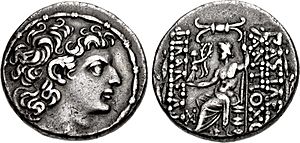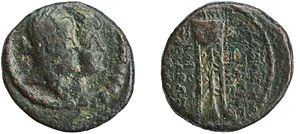Antiochus XIII Asiaticus facts for kids
Quick facts for kids Antiochus XIII |
|
|---|---|
| Asiaticus | |

Tetradrachm of Antiochos XIII, with Zeus Nikephoros on the reverse, minted at Antioch.
|
|
| King of the Seleucid Empire (King of Syria) | |
| Reign | 69–64 BC (client king under Pompey) |
| Predecessor | Cleopatra Selene of Syria and Seleucus VII Kybiosaktes |
| Successor | Philip II Philoromaeus |
| Born | Unknown |
| Died | 64 BC |
| Dynasty | Seleucid |
| Father | Antiochus X Eusebes |
| Mother | Cleopatra Selene of Syria |
Antiochus XIII Philadelphus, also known as Asiaticus, was one of the last kings of the Seleucid Empire. This was an ancient Greek kingdom in Asia.
About Antiochus XIII
Antiochus XIII was the son of King Antiochus X Eusebes. His mother was Cleopatra Selene of Syria, a princess from the Ptolemaic dynasty of Egypt. After his father died, his mother, Cleopatra Selene, became a "regent." This means she ruled the kingdom for Antiochus XIII because he was too young. This happened sometime between 92 and 85 BC.
Seeking Recognition
Around 83 BC, a powerful ruler named Tigranes the Great conquered Syria. After this, Cleopatra Selene traveled to Rome. She wanted the Roman leaders to recognize her sons as kings of Egypt. However, her efforts were not successful.
Later, between 75 BC and 73 BC, Antiochus XIII and his brother were recognized as "Kings of Syria." They were able to live like royalty. Sadly, Tigranes eventually captured Cleopatra Selene and killed her.
Becoming King
In 69 BC, the Roman general Lucius Licinius Lucullus defeated Tigranes at the Battle of Tigranocerta. After this victory, the people of Antioch welcomed Antiochus XIII as their new king. Lucullus agreed to this. He made Antiochus XIII a "client ruler" of Syria. This meant Antiochus ruled Syria, but he had to follow Rome's wishes.
End of His Reign
In 64 BC, another Roman general, Pompey, arrived in Syria. Pompey decided to remove Antiochus XIII from power. He had Antiochus killed by a Syrian chieftain named Sampsiceramus I.
Antiochus's death is often seen as the end of the Seleucid dynasty. However, another king, Philip II Philoromaeus, ruled for a short time after him.
See also
 In Spanish: Antíoco XIII Asiático para niños
In Spanish: Antíoco XIII Asiático para niños
 | Jackie Robinson |
 | Jack Johnson |
 | Althea Gibson |
 | Arthur Ashe |
 | Muhammad Ali |


